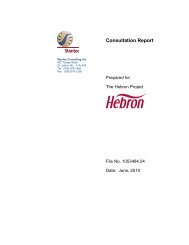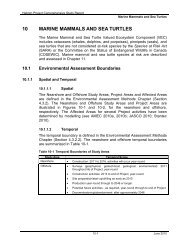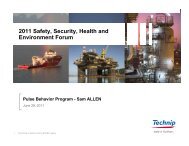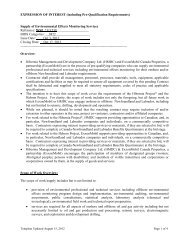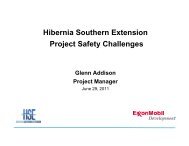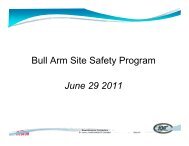Canada-Newfoundland and Labrador Benefits Plan - Hebron Project
Canada-Newfoundland and Labrador Benefits Plan - Hebron Project
Canada-Newfoundland and Labrador Benefits Plan - Hebron Project
You also want an ePaper? Increase the reach of your titles
YUMPU automatically turns print PDFs into web optimized ePapers that Google loves.
<strong>Hebron</strong> <strong>Project</strong> Section 3<br />
<strong>Benefits</strong> <strong>Plan</strong><br />
<strong>Benefits</strong> Approach, Principles, Policies,<br />
Guidelines <strong>and</strong> Procedures<br />
gap analysis (Strategic Concepts, Inc., 2010) that forms the basis of the capacity<br />
assessment in Section 4.0 of this <strong>Plan</strong>.<br />
Table 3.3.4-1: Staffing Dem<strong>and</strong>s <strong>and</strong> Supply Initiatives<br />
EMCP <strong>and</strong> its main contractors will develop <strong>and</strong> submit to the C-NLOPB, a detailed<br />
operations phase human resources plan one year preceding first production<br />
Human resources requirements for the <strong>Project</strong> will be communicated in advance, where<br />
necessary, to enable individuals to train for opportunities<br />
Where appropriate, main contractors will be required to prepare <strong>and</strong> submit plans to<br />
EMCP that identify projected staffing requirements<br />
3.3.4.2 Communication <strong>and</strong> Consultation<br />
Consultation meetings with a range of education <strong>and</strong> training resources,<br />
including the Provincial Skills Task Force, the Women’s Policy Office, the<br />
Petroleum Industry Human Resources Committee, <strong>and</strong> Memorial University <strong>and</strong><br />
the College of the North Atlantic, have provided valuable input in human<br />
resources planning considerations, particularly in the areas of employment <strong>and</strong><br />
training. Continued collaboration between EMCP, <strong>Project</strong> contractors <strong>and</strong> such<br />
groups will be important to the success of the human resource planning process<br />
in future years <strong>and</strong> decades.<br />
In particular, the provision of <strong>Project</strong> labour requirements information will help<br />
training <strong>and</strong> educational institutions in designing <strong>and</strong> delivering training that will<br />
prepare <strong>Newfoundl<strong>and</strong></strong>ers <strong>and</strong> <strong>Labrador</strong>ians, including members of the<br />
designated groups, for employment on the <strong>Project</strong>.<br />
3.3.4.3 Skills Development through Community Investments<br />
EMCP has a history of supporting <strong>and</strong> improving local community organizations<br />
<strong>and</strong> educational programs so as to promote the development of skills <strong>and</strong><br />
experience to fulfill future human resource needs. EMCP supports a wide variety<br />
of educational programs that encourage students, <strong>and</strong> particularly members of<br />
the designated groups, to pursue mathematics <strong>and</strong> science-related education.<br />
For example, EMCP currently supports initiatives such as the Techsploration<br />
program, which targets young women in school <strong>and</strong> encourages consideration of<br />
technical fields of study <strong>and</strong> work. EMCP also provides funds <strong>and</strong> volunteers for<br />
Junior Achievement’s Economics of Staying in School program, which<br />
communicates the value of staying in school to grade nine students.<br />
ExxonMobil <strong>Canada</strong> Properties 3-25 April 2011



